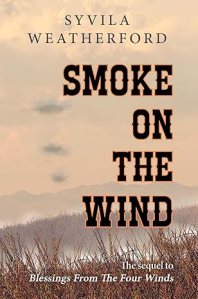Synopsis:
“Smoke on the Wind” is a captivating tale that weaves the perils and dangers encountered on the Western frontier by Will Lawton, a young Black cowboy, after kidnapping then wedding his young Native American bride, Niabi. He plods a path packed with uncertainty that ultimately winds its way to an unthinkable opportunity – a race for free land.
Follow the characters of Smoke: the beautiful Louisa Ortega, who haunts the memory of the Chief’s son, Nashoba; Captain Horton, head of Fort Townsend, charged with keeping peace between settlers and tribes, and Dakota Sam, a rambunctious Civil War veteran attached to his military blues and backwoodsman ways.
This is the second book in an epic series, following the success of Weatherford’s first novel, “Blessings from the Four Winds.”
In this sequel, new characters are introduced: Liao Ming Chow, a Chinese immigrant, Sargent Thomas of the Buffalo Soldiers, and Mr. Todd Morgan the railroad tycoon. Niabi and Will raise two children and enjoy the protective company of their horses: Rodeo and FireTip. Their journey is marked by resilience, the spirit of community, and the ongoing struggle for safety and belonging.
Favorite Lines:
“For these groups, opportunities do not arise so easily; they are as elusive as smoke on the wind.”
My Opinion:
I received a copy of this book from the author in exchange for my honest opinion.
Set in the Reconstruction-era South, Weatherford’s novel continues the story begun in Blessings from the Four Winds, but stands firmly on its own as a sweeping, character-driven story about freedom, resilience, and love tested by circumstance.
From the very first pages, the tone is cinematic. You can almost smell the smoke rising from the black stovepipes and hear the soft clatter of boots across wooden floors. The novel shifts between places — from Tennessee ranches to the Indian Territory and the bustling streets of Little Rock — but it never loses its emotional touch. At its heart are Will Lawton, a young Black cowboy determined to carve out a life of his own, and Niabi, the Choctaw woman who becomes his wife. Around them swirl entire communities: families, servants, veterans, and ranchers all carrying their own dreams and burdens in a world still figuring out what freedom really means.
What’s remarkable about Weatherford’s writing is her ability to move between intimacy and scale. A single paragraph might linger on a woman’s quiet act of defiance, then widen out to capture the changing face of a country still reeling from war. Her writing feels deeply researched but never academic — she writes with the rhythm of someone who has listened carefully to how history actually sounded when it was spoken aloud.
There’s also an honesty to how she writes women. Characters like Louisa Ortega, bold and restless, and Harriet Lawton, dignified and determined, feel drawn from real memory. They live with both fear and agency. Weatherford doesn’t romanticize their hardship, but she refuses to flatten them into archetypes. There’s courage in the everyday details — the tightening of a corset, the passing of a letter, the act of speaking when silence would be safer.
The story moves slowly, deliberately, in the way that good historical fiction should. You’re not just reading what happens, you’re living in the space between the moments, feeling how time presses on each character differently. By the time the final chapters arrive, you realize the title isn’t just poetic; it’s prophetic. The past, like smoke, drifts and lingers. It never disappears — it reshapes itself on the wind.
Summary:
Overall, Smoke on the Wind is a vivid continuation of America’s untold stories — where race, heritage, and faith collide. It’s tender and unflinching, full of voices that feel like they’ve been waiting a century to be heard. Weatherford writes history the way it deserves to be written: not as distant fact, but as living memory. For readers who are drawn to immersive, historical fiction. Happy reading!
Check out Smoke on the Wind here!
